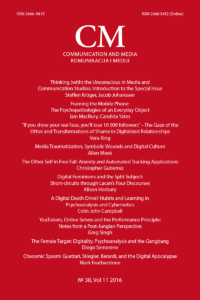A Digital Death Drive? Hubris and Learning in Psychoanalysis and Cybernetics
A Digital Death Drive? Hubris and Learning in Psychoanalysis and Cybernetics
Author(s): Colin John CampbellSubject(s): Psychology, Communication studies
Published by: Fakultet političkih nauka Univerziteta u Beogradu
Summary/Abstract: This paper offers a critique of the fetishisation of 'the digital' in Western culture by bringing together Freudian and Marcusian psychoanalytic theory with Gregory Bateson's cybernetics. In particular, it correlates the cybernetic concepts of analog and digital information with the psychoanalytic conceptual pair of Eros and Thanatos. The psychoanalytic concept of the 'death drive' appears through the cybernetic lens as a fetishistic tendency towards freezing or regressing to lower levels of complexity and sensitivity of learning. With the help of Marcuse and Bateson, I understand the contemporary prevalence of a 'digital death drive' as an inhibition of learning in terms of the nature of the digital and its severing from the analog context. By contrast, by reading Marcuse's concept of Eros as having multiple logical levels (Eros1,2,3) in the cybernetic sense and by comparing these levels with Bateson's multiple logical levels of learning (Learning1,2,3), we come to see Marcusean 'erotic liberation' or 'revolutionary love' not as resulting from simple acts or statements of rebellion against repressive socio-political norms, but rather as being profound, lifelong learning processes, fraught with complexity and difficulty.
Journal: CM Komunikacija i mediji
- Issue Year: 11/2016
- Issue No: 38
- Page Range: 195-216
- Page Count: 22
- Language: English

